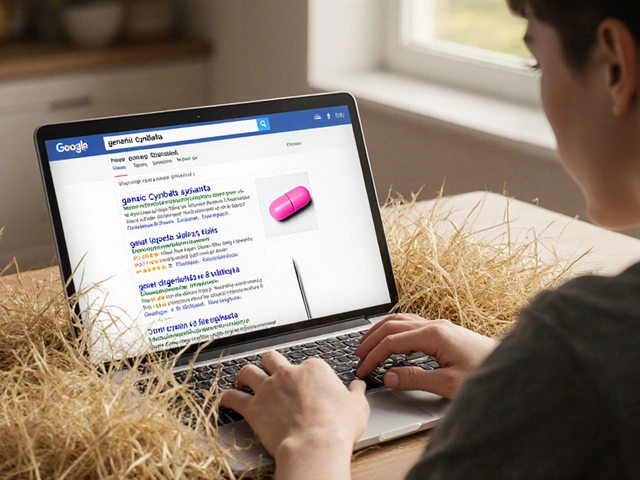
Allergies can be a real bummer, right? Whether you’re allergic to pollen, dust, or that adorable cat next door, dealing with itchy eyes, sneezing, and all the rest can feel overwhelming. Many people have relied on Loratadine for relief, but in 2025, there are other contenders to consider.
We're digging into ten top alternatives that might suit you better depending on your specific needs. Some of these options might be strong and work wonders for sudden allergic reactions, while others might be better for daily, long-term use. It's like having a toolbox for those times when seasonal allergies hit hard, and you’ve got to find what fits your lifestyle.
Choosing the right medication can seem like a chore, especially with so many factors to consider like the level of drowsiness, effectiveness, and how often you need to take it. So, let’s break down these options, no fuss, just clear information on each one.
- Promethazine (Phenergan)
- Cetirizine (Zyrtec)
- Fexofenadine (Allegra)
- Diphenhydramine (Benadryl)
- Levocetirizine (Xyzal)
- Desloratadine (Clarinex)
- Chlorpheniramine (Chlor-Trimeton)
- Hydroxyzine (Vistaril)
- Rupatadine
- Bilastine
- Comparison Table
Promethazine (Phenergan)
Alright, let’s chat about Promethazine, better known as Phenergan. It's one of those powerful first-generation antihistamines that’s been around the block for a while. This drug isn’t just stopping at allergy relief; it's versatile enough to handle motion sickness and even offers some sedation benefits. Amazing, right? People might reach for it when dealing with those sudden, severe allergic attacks.
Now, how does it stack up against good ol’ Loratadine? For starters, Promethazine is prescription-only. That means you're likely making a trip to the doctor before getting your hands on it. The reason? It's got some strong effects and isn't meant for casual, everyday use. It's more like using a sledgehammer when you’ve got a stubborn nail to deal with.
Pros
- Potent Relief: Excellent for acute allergy situations where you need quick and sure relief.
- Anti-nausea Properties: Double duty as it helps manage both allergies and nausea, a bonus if you’ve been on a bumpy ride.
Cons
- Sedation Risk: This one can make you quite drowsy, so driving or operating heavy machinery? Probably not the best idea.
- Extrapyramidal Symptoms: Fancy term, but it boils down to possible uncomfortable muscle movements or restlessness.
- Not Ideal for Long-term Use: Think short sprints rather than marathons here; it’s not the best choice for ongoing management.
Promethazine shines when you need something that's going to tackle those stubborn symptoms head-on, especially when other medications just aren’t cutting it. Just keep in mind, it’s strong stuff and not a decision to be made lightly if you’re looking for an everyday solution.
Cetirizine (Zyrtec)
Cetirizine, often recognized by its brand name Zyrtec, is a popular choice for tackling those annoying allergy symptoms without knocking you out. This second-generation antihistamine is over-the-counter, making it super accessible for many folks. It's one of those meds that work by blocking histamine, that pesky chemical responsible for triggering sneezes and sniffles.
What's great about cetirizine is its ability to ease symptoms like runny nose and itchiness without making you feel like you pulled an all-nighter. It usually kicks in within an hour and provides relief for up to 24 hours, so you can go about your day without constantly reaching for the tissue box.
Pros
- Non-drowsy for most people, keeping you alert and awake.
- Works fast and lasts 24 hours, so it's your buddy throughout the day.
- Easily accessible over-the-counter, which is handy for impromptu allergy attacks.
Cons
- In certain individuals, it can still cause some drowsiness.
- Not suitable for everyone, especially if you have liver issues.
- Can interact with other meds, so checking with a healthcare provider is a smart move.
For many, zyrtec has become a go-to remedy for allergies due to its balance between effectiveness and minimal sedation. That's the main draw, especially for anyone who needs to stay focused whether at work or play. But, like anything, it’s not a one-size-fits-all solution. Understanding how it works for you can make a world of difference in managing your allergy treatment.
Fexofenadine (Allegra)
Fexofenadine, often known by the brand name Allegra, is a pretty popular choice when it comes to fighting off pesky allergy symptoms. It's a second-generation antihistamine, which means it's less likely to cause drowsiness compared to first-generation meds. This is a huge win for folks needing to stay alert throughout the day while managing their allergies.
One of the big pros of Fexofenadine is its focus on relieving sneezing, itchy throat, and runny nose without making you feel like you need a nap. It's often recommended for people who need to stay sharp – say, if you have a big work presentation or are just trying to keep up with the kids. Plus, it’s available over-the-counter, so you can grab it without a prescription, which is super convenient.
Pros
- Non-drowsy formula, making it perfect for daytime use.
- Addresses multiple allergy symptoms such as sneezing and runny nose.
- Widely available over-the-counter.
Cons
- May not be as effective for severe allergy symptoms.
- Can be pricier compared to other over-the-counter antihistamines.
- Effectiveness can vary from person to person.
Statistics say that Fexofenadine works for about 50-60% of individuals, showing moderate to high effectiveness in reducing typical allergy symptoms. Its 12 to 24-hour lasting power means you don't have to take it all day long, just once or twice and you're covered.
Diphenhydramine (Benadryl)
Let’s chat about Diphenhydramine, better known as Benadryl. This is a staple name in the world of allergy relief. Ever been kept awake by relentless itching or hives? This is where Benadryl steps in as a classic go-to, especially in the middle of the night when everything else feels like it's failing.
Developed ages ago, Diphenhydramine is a first-generation antihistamine that packs a punch. It's super effective against those allergy symptoms that sneak up on you, like when your eyes suddenly start drama-queening or your nose declares war. However, it’s well-known to produce sedation, which makes it awesome if you need to quickly catch some Z’s but is not the best choice if you’ve got deadlines to meet or kids to chase around. Remember, multitasking might not be your best friend here.
Pros
- Powerful relief for acute allergy symptoms.
- Helps manage allergic reactions that need urgent care.
- Cheap and easy to find at pretty much any drugstore without a prescription.
Cons
- Causes significant drowsiness, making it risky for drivers or heavy machinery operators.
- Shorter duration, so you might have to keep taking it more frequently.
- Not ideal for regular daytime activities or long-term treatment.
Did you know that aside from stifling those allergy symptoms, Benadryl can also be a hero for motion sickness and even as a mild sleep aid, thanks to its ultra-sedative powers? Just a heads up, though, handling kids' allergies with Diphenhydramine needs a careful look at recommended dosages and always consulting with a healthcare provider.
Levocetirizine (Xyzal)
Another player in the world of allergy treatment is Levocetirizine, better known as Xyzal. This little helper is a newer antihistamine sourced from Cetirizine. The beauty of Xyzal is that it's a bit more advanced, staying effective longer, and you only need to take it once a day. Talk about convenient!
For those who find themselves annoyed by a runny nose or sneezing fits, this is a strong contender. It's particularly useful if you find yourself battling allergies both during the day and at night. One well-known allergist mentioned,
"Xyzal offers excellent 24-hour relief, allowing patients to wake up feeling refreshed, free from allergy symptoms."
Pros
- Long-lasting 24-hour relief.
- Less drowsiness compared to first-generation antihistamines.
- Effective for a variety of allergies, including seasonal rhinitis.
Cons
- Available by prescription, not over-the-counter.
- Some users report minor drowsiness.
- Not recommended for people with severe kidney issues.
Xyzal is mostly side-effect free, but always consider your body's unique reactions and medical history. If you’re switching from Loratadine, it might be worth discussing with your doctor. As always, it’s about finding what works best for you—something that fits your life, and not the other way around.

Desloratadine (Clarinex)
Desloratadine, known to many as Clarinex, is like the cool cousin of Loratadine alternatives. It's part of the newer generation of antihistamines that put a strong emphasis on minimizing drowsiness. Sweet, right? What this means for regular folks like us is the freedom to tackle our daily tasks without the risk of unexpectedly nodding off.
When it comes to allergy treatment, Desloratadine stands out for its long-lasting effect, offering around-the-clock relief. This is particularly awesome if your allergies have a sneaky way of striking at unpredictable times. Plus, fewer doses mean less hassle. Want to know if this will sort out your runny nose or itchy eyes? Well, Desloratadine is often prescribed for hay fever, hives, and skin rashes, covering several regular allergy scenarios.
Pros:
- Non-drowsy formula — tackle your day without feeling sluggish.
- Long-lasting relief works up to 24 hours — perfect for busy schedules.
- Treats a variety of allergy symptoms, from sneezing to hives.
Cons:
- Might interact with other medications — always a good idea to chat with a healthcare provider.
- Can be pricier than some over-the-counter options.
- Not suitable for kids under age 6 without consulting a doctor.
Here's a quick peek at how Clarinex stacks up against its competition:
| Alternative | Drowsiness | Duration | Ideal Use |
|---|---|---|---|
| Desloratadine | Low | 24 hours | General allergies |
| Loratadine | Low | 24 hours | Mild allergies |
All in all, Desloratadine is a strong contender among antihistamines. Whether you're battling seasonal allergies or an unexpected dust attack, it might just offer the relief you need without the heavy eyelids.
Chlorpheniramine (Chlor-Trimeton)
Chlorpheniramine, often marketed as Chlor-Trimeton, is like one of those old-school remedies that still packs a punch. This first-generation antihistamine is known for calming down those aggravating allergy symptoms that can put a damper on your day. While it might not be as flashy as some of the newer meds, it gets the job done.
This medication is particularly helpful if you're dealing with seasonal allergies or have some pesky perennial ones. It works by blocking a substance in the body called histamine, which is responsible for those annoying symptoms like sneezing or itchy, watery eyes. Chlorpheniramine might even give your runny nose a break.
Pros
- Effective for a wide range of allergy symptoms.
- Generally available without a prescription, making it easier to get.
- Affordable compared to some newer alternatives.
Cons
- Can cause drowsiness, which might not be ideal if you’re planning to be active or need to stay alert.
- Some people experience dry mouth or dizziness as side effects.
- Not the best choice if you're looking for something non-drowsy.
One cool thing to note is that despite causing drowsiness, some folks actually welcome this side effect, especially if allergies are keeping them from catching enough Z’s. But, like with everything, it’s not one-size-fits-all. If you're trying to stay awake through a busy day, combining Chlorpheniramine with work or driving might not be the best plan.
For many, it’s all about finding that balance and seeing what fits your lifestyle. While Chlorpheniramine may not be the newest kid on the block, it’s dependable and worth considering if your allergy symptoms need a straightforward, effective solution.
Hydroxyzine (Vistaril)
If you've ever had the telltale itchy hives or anxiety that's tough to shake, you might have been prescribed Hydroxyzine, known by the brand name Vistaril. This one’s been around for quite a while, offering a two-for-one punch: allergy relief and a calming effect.
Hydroxyzine is a first-generation antihistamine, which means it’s known to cause drowsiness. But here's the thing—sometimes that can be helpful, especially if you're dealing with anxiety or having trouble sleeping because of allergies. Doctors often prescribe this medicine for short-term anxiety relief alongside allergy symptoms, making it a bit of a multitasker.
A quick heads up, though: because it's a bit older and not super selective in what it targets, you'll probably feel some sedation. If you're new to this medication, it's a good idea to take it when you don't have to be on your A-game, just to see how it affects you.
Pros
- Effective for severe allergy symptoms.
- Provides anxiety relief and helps with sleep.
- Dual functionality can be convenient for those with both allergies and anxiety.
Cons
- High sedation levels; not great if you need to stay alert.
- Not ideal for long-term use due to side effects.
- Can interact with other medications, so a chat with your doctor is a must.
While Hydroxyzine offers solid relief, it's not for everyone, especially if staying awake is your top priority. But for those tough days when allergies and anxiety team up against you, this could be worth considering. Just remember—the best choice depends on what you need more: an uninterrupted day or a peaceful night.
Rupatadine
Rupatadine is a nifty little option for folks battling those pesky allergy symptoms. Not just tackling the old runny nose and sneezes, it also combats hives. Living with allergies in 2025 got a tad more relaxed thanks to this dual-action gem.
What sets Rupatadine apart? It's known for not causing sedation as much as some older antihistamines. You won't feel like you've downed a cup of warm milk before tackling the day. This makes it a favorable choice for those who need to keep their energy up and running while managing symptoms.
Pros
- Targets both allergic rhinitis and urticaria, giving you relief across the board.
- Lower sedation risk, which means you can get stuff done without feeling drowsy.
- Long-lasting effect, fewer pills to pop through the day.
Cons
- Available in some places as a prescription-only drug, so accessibility could be a hassle.
- Though rare, some folks might experience headaches or dry mouth.
Loratadine alternatives like Rupatadine are slowly becoming popular, even if they’re not on the shelf of every drugstore just yet. But keep an eye out; it’s gradually becoming a front-runner in the allergy relief race. With its dual benefits and less intense side effects, it's a smart choice for long-term allergy management.
Bilastine
Bilastine is one of those newer-gen antihistamines folks have turned to in recent years. Known for effectively handling symptoms of allergic rhinitis and urticaria, it’s become a solid choice for many. Its beauty lies in minimal drowsiness, so you're not left feeling sluggish while trying to tackle those allergy demons.
According to Dr. Emily Shaw, an allergist at the National Allergy Institute, "Bilastine provides relief akin to more traditional antihistamines but without the baggage of feeling perpetually tired."
One of the interesting things about Bilastine is that it doesn’t engage with food as much, meaning you can take it without worrying about having to align it with meal times. It's available in once-daily doses, making it super convenient for those busy bees who can’t be bothered popping pills multiple times a day.
Pros
- Low risk of causing drowsiness
- Good control over inflammation and allergic symptoms
- Flexibility of dosing without needing to align with meals
Cons
- Might not be as strong as older antihistamines for severe reactions
- Not as widely available in every pharmacy compared to more established options
For people tired of feeling groggy, Bilastine can be a game-changer. It's about finding what gels with your life while keeping those annoying sniffs and sneezes at bay. Plus, it's always nice to have options, right?

Comparison Table
Alright, let's wrap things up with a neat little bow by diving into a handy comparison table. When it comes to choosing between these Loratadine alternatives, it's super helpful to have all the details right there in front of you. This table breaks down key factors like sedation risk, allergy relief strength, and special features, so you can quickly see which med might be your new best friend.
| Medication | Sedation Risk | Allergy Relief | Special Feature |
|---|---|---|---|
| Promethazine (Phenergan) | High | Strong | Anti-nausea properties |
| Cetirizine (Zyrtec) | Moderate | Consistent | Good for daily use |
| Fexofenadine (Allegra) | Low | Strong | Non-drowsy formula |
| Diphenhydramine (Benadryl) | Very High | Strong | Fast-acting, good for emergency |
| Levocetirizine (Xyzal) | Moderate | Consistent | Evening dose for next-day relief |
| Desloratadine (Clarinex) | Low | Strong | Once-daily tablet |
| Chlorpheniramine (Chlor-Trimeton) | High | Variable | Inexpensive |
| Hydroxyzine (Vistaril) | High | Strong | Also used for anxiety |
| Rupatadine | Low | Consistent | Offers anti-inflammatory effects |
| Bilastine | Low | Consistent | No weight gain potential |
Each of these antihistamines has its own strengths, geared towards different needs. If staying awake is a priority, options like Fexofenadine and Bilastine have got your back with low sedation effects. But if you need serious allergy firepower, don't ignore the might of Diphenhydramine, albeit with a drowsiness warning.
Armed with this table, you're now ready to match the right medication to what helps you win your daily battle with allergies. Remember, everbody's different, so think about what fits your lifestyle best!




Matthew Ulvik
July 18, 2025 AT 15:07Hey folks, this post is pretty solid for anyone dealing with allergies and looking to switch things up from Loratadine.
It's super important to have options because, honestly, not every medicine works the same for every person. From what I gather, OTC options like cetirizine or fexofenadine might work better for some people with fewer side effects.
Also, some of the prescription alternatives mentioned might be your go-to if OTC meds aren't cutting it—but always consult your doc before making moves!
Just a reminder, managing allergies isn't one-size-fits-all, so this list definitely helps everyone find their perfect fit. Anyone tried any of these alternatives recently and had good results? 😊
Dharmendra Singh
July 22, 2025 AT 07:27Thank you for sharing this article. In places like India, many people rely on loratadine as a default allergy medication.
However, I want to add that some alternatives presented may not be easily accessible or affordable everywhere. This is an important aspect to consider when discussing allergy management globally.
Further, herbal or traditional remedies are sometimes preferred by individuals due to cultural beliefs and fewer side effects. Maybe that could be explored more in future discussions?
Overall, the article is a good overview, but accessibility and cultural relevance should also be considered to make an informed choice truly.
Rocco Abel
July 25, 2025 AT 06:34Honestly, while this list has good information, I always wonder about the pharmaceutical companies pushing these alternatives.
Is this really about patient care, or are these just new ways to keep us subscribed to different meds with their added profits? I mean, Loratadine has been around for ages—it works and it’s cheap.
We should be cautious about blindly following new meds just because they sound ‘‘better’’ or are ‘‘trendy’’ in 2025.
Also, these newer meds sometimes come with side effects we don’t fully know about yet. So, a healthy dose of skepticism is necessary here.
Anyone else skeptical about new allergy drugs flooding the market?
Dawn Mich
July 26, 2025 AT 16:44This is all well and good, but I'm wondering how much of this allergy med stuff is totally influenced by Big Pharma’s desperate attempts to keep the cash flowing.
Like, why do we need so many alternatives anyway? Could it be that loratadine is being quietly sidelined in favor of newer, more expensive versions that give less actual relief?
I guess sometimes these articles can be double-edged swords—informative but also kinda serving as marketing tools?
It makes me question everything about allergy treatments nowadays. Anyone else think the system is rigged?
Ugh, it feels like we're just guinea pigs for the next big pharma cash grab.
Eric Sevigny
July 29, 2025 AT 13:21This article provides a useful summary, particularly for those who have been using loratadine and find it less effective over time.
However, it’s important for readers to understand the differences in antihistamine generation and the potential sedative effects of alternatives.
For example, some second-generation antihistamines are less likely to cause drowsiness, which is a huge factor for many patients.
Also, new molecules and formulations are being studied for longer action without compromising safety. This may benefit allergy sufferers in the near future.
That said, individual responses vary, so be sure to consult with healthcare professionals about which alternative fits your needs best.
Glenda Rosa
August 1, 2025 AT 18:51Honestly, I find this whole craze about switching from loratadine kinda overrated.
People need to realize that not all "alternatives" are created equal, and some are nothing more than hyped-up, overpriced products that don't deliver on their promises.
The phrase "most effective alternatives" is a bit colorful, don't you think? Effectiveness varies wildly by individual response.
Plus, the pharmaceutical industry loves to keep us chasing the next big thing while the old reliable meds get shoved to the sidelines.
If someone finds loratadine working for them, maybe sticking to it isn’t such a bad idea instead of hopping on every new chemical out there. Just my two cents.
charlise webster
August 4, 2025 AT 17:41See, I kinda disagree with the whole idea that sticking to one tried-and-tested allergen med is the best approach.
Sure, loratadine might work for many, but new developments in allergy meds often bring in improvements in terms of fewer side effects or faster relief.
It's stupid to resist change just because an existing option is "good enough." Medical science moves forward for a reason.
But I do agree the article could have dived deeper into efficacy comparisons and real-life user feedback rather than just listing alternatives.
Also, it's kinda meh if they haven't expanded on the contraindications or warnings with switching meds.
lata Kide
August 7, 2025 AT 10:41OMG, does anyone else think that the article missed out on some super important info? 💥💊
Like, how about natural alternatives or lifestyle changes that can reduce allergy symptoms without popping a pill every day? 🌿🌸
Also, I feel like they barely scratched the surface on side effects, peeps! Ya gotta know what you’re getting into! 😱
And don't even get me started on how often doctors push meds without exploring holistic options first! 🙄
Seriously, we need more drama and tea on how allergy meds really affect our bodies over the long haul!
Mark Eddinger
August 10, 2025 AT 07:01The article thoughtfully enumerates many alternatives that reflect the recent advancements in allergy pharmacotherapy.
However, I would advise caution to readers in interpreting the information as a replacement for professional medical advice.
Pharmacodynamics and individual patient factors can heavily influence efficacy and safety profiles of these alternatives to loratadine.
Moreover, given the frequent occurrence of cross-reactivity, patients should be monitored for adverse reactions when transitioning between antihistamines.
Overall, knowledge is empowering, but consultation with a healthcare provider remains imperative.
Francisco Garcia
August 14, 2025 AT 01:17Interesting read! I’ve always been curious about how allergy meds evolve over time. With so many options out there, it's cool to have a rundown focused on 2025.
Does anyone know if some of these alternatives target specific types of allergies better? Like seasonal vs. pet allergies?
Also, maybe worth sharing personal experiences about how well these alternatives worked compared to loratadine?
Sharing what actually works in day-to-day life can make these kinds of lists way more useful.
Looking forward to hearing if some here have switched recently and what your takeaways are!
Patrick Renneker
August 17, 2025 AT 14:34While the enumeration of alternatives to loratadine provides a comprehensive overview pertinent to the year 2025, I posit that the cursory treatment of pharmacological nuances therein somewhat detracts from the article’s utility.
Indeed, the specific mechanisms of action, differential receptor affinities, and metabolic pathways associated with these antihistamines warrant elaboration, especially for the discerning reader who values depth over shallow generalities.
Furthermore, the article neglects the critical analysis of potential drug interactions, a matter of paramount importance given the polypharmacy prevalent amongst allergy sufferers.
Hence, despite its apparent breadth, the piece falls short in delivering a truly exhaustive review essential for informed clinical decisions.